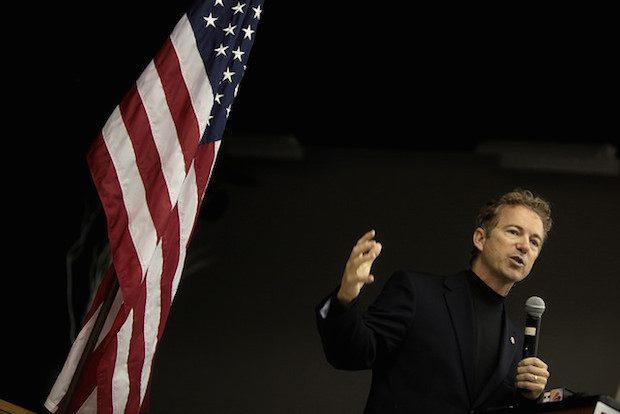Here’s How Rand Paul’s Conservative Realism Could Change the GOP

If you want a preview of the standard Republican critique of Rand Paul’s foreign policy ahead of the 2016 primaries, Illinois Congressman Adam Kinzinger is your man.
The freshman lawmaker told ABC’s “This Week” that his fellow Republican “put out budgets to cut the military in half.” To drive the point home, Kinzinger added, “I think that would be devastating for our party right now on national security.”
Nonpartisan fact-checkers have rated Kinzinger’s assertion about the size of Paul’s proposed defense cuts false. But if you throw in the “I word”—isolationism, naturally—that’s pretty much what the Kentucky senator can expect from the kind of Republican who would “love” to see Jeb Bush run for president.
Paul has increasingly been pushing back against such caricatures. The latest example is his speech last week to the Center for the National Interest: “The Case for Conservative Realism.” More artfully crafted than some of his previous foreign-policy addresses, it might not have been right in every particular. It is, however, part of a project that has value beyond Paul’s presidential prospects.
It is necessary to present an alternative to the bipartisan foreign-policy consensus that has caused the United States to bounce from one ill-conceived military intervention to the next, with results that range from inconclusive to disastrous. Since the most extreme version of that consensus dominates Republican thinking, it would be optimal for the alternative to take root in the GOP.
To be a real alternative, it cannot simply be another set of views some Republicans could conceivably hold. It must be politically viable, palatable to sufficient numbers of the GOP nominating electorate to successfully put forward more than the occasional House backbencher.
Furthermore, this foreign policy must command enough assent from governing elites that qualified professionals would exist to implement it in the event sympathetic politicians were elected. And it must be a foreign policy that could actually work, not one that waves away genuine national-security threats or pretends that United States could become Switzerland.
That means politically this foreign policy must be able to galvanize the biggest constituency for peace within the Republican Party—the libertarians, constitutional conservatives, and other noninterventionists who backed Senator Paul’s father in the last two presidential campaigns. At the same time, it must be accessible to a larger swathe of the Republican rank-and-file.
Part of that means joining the still-young Ron Paul movement with older Republican foreign-policy traditions that remained well within the party’s mainstream as recently as George H.W. Bush’s presidency.
All of that is obviously much easier said than done, and that’s without even getting into the merits of the substantive foreign policy itself. But even the wisest policies cannot prevail if there are no elected or appointed officials in place willing to carry them out. At the moment, it’s a task that Rand Paul has almost entirely to himself.
So what does Paul’s alternative foreign policy actually look like? He is skeptical of wars for regime change that seek to overthrow regional bad actors like the governments of Iraq or Libya, and also of arming rebels in an effort to influence the outcomes of civil wars in which there is no obvious pro-American side.
Paul is willing to use military force to contain and deny a territorial base to the kinds of Islamic radicals who attacked the United States on 9/11. But he also recognizes that some interventions can end up empowering those radicals: directly by inadvertently helping weapons fall into the hands of the very people we are trying to defeat or creating power vacuums they can fill, or indirectly by inflaming anti-Western passions that help terrorists recruit.
Barack Obama also offered a limited critique of U.S. foreign policy that accepted the challenges of the war on terror but attempted to avoid “dumb wars” and “stupid shit.” Once in office, that critique further eroded to the point that dumb wars and stupid shit happened—even with a set of advisers who are on balance less hawkish than those who will likely be available to the next Republican president.
Obama’s example plus legitimate questions about the wisdom of Paul’s ISIS strategy make skeptics out of some who would like to be sympathetic to the senator. Yet with Hillary Clinton looming as the likely Democratic nominee and most other Republican presidential hopefuls still singing from the same Bush-era song sheet, a lot is riding on whether Paul can resurrect conservative realism.
W. James Antle III is editor of the Daily Caller News Foundation and author of Devouring Freedom: Can Big Government Ever Be Stopped?
Comments